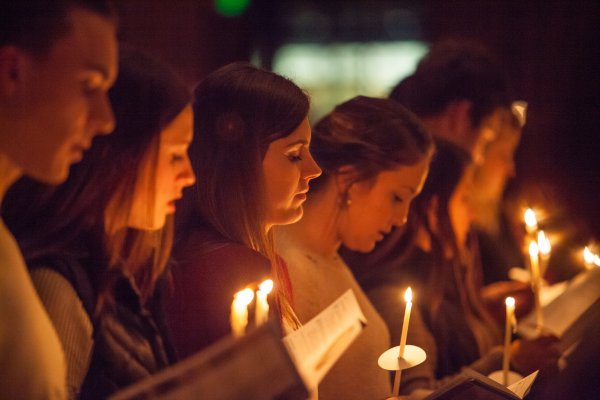Welcoming Words
Do not neglect to show hospitality to strangers, for thereby some have entertained angels unawares
Hebrews 13:2
Hospitality is a fundamental ethical obligation shared by many religious traditions, including Christianity. When we are hospitable, we extend a friendly welcome (even to strangers) and offer gifts, such as food, shelter, or entertainment. Abraham and Sarah practice hospitality in Exodus 18 by welcoming three mysterious strangers and giving them an opportunity to rest, water to wash their feet, and an elaborate meal. Hebrews 13:2 provides a well-known commentary referencing Abraham and Sarah’s actions: “Do not neglect to show hospitality to strangers, for thereby some have entertained angels unawares.” Scholar Christine Pohl notes that true hospitality involves a warm welcome into a specific physical place with personal meaning and value, and that “it requires an openness of heart, a willingness to make one’s life visible to others, and a generosity of time and resources.”
In the Christian tradition, in an unexpected reversal, the greatest host is God, who, in an act of grace, welcomes all to the Kingdom. Jesus practiced such unconditional hospitality. In welcoming all to the table to partake of bread and wine, Jesus gave his very self in the most radical act of hospitality. Pohl explains what this implies about human hospitality: “Hospitality is important symbolically in its reflection and reenactment of God’s hospitality . . . . Though part of everyday life, hospitality is never far removed from its divine connections.” Christian hospitality is practiced both by God and God’s people.
It is fitting, then, that we should start this new year with words of welcome—to each other as we return to campus or Zoom, to all new members of the Valpo community, and specifically to our new University Pastor, Katherine Museus Dabay. We welcome her especially to the Chapel of the Resurrection, a physical place with so much meaning and value. Pastor Kate comes from Tennessee, where she served for five years as the associate pastor of St. Andrew Lutheran Church. During her college years at Hamline University in St. Paul, Minn., Pastor Kate found the campus ministry program an important formative part of her life, helping her to discern her identity as a child of God called to lead and serve other college students.
An ordained pastor in the Evangelical Lutheran Church in America (ELCA), Pastor Kate will work collaboratively with Lutheran Church – Missouri Synod University Pastor James Wetzstein to lead campus worship services and student ministry organizations, and to counsel and mentor Valpo students. Pastor Kate is passionate about service, striving for peace and justice, and exploring deep questions of life and faith. I am thrilled to welcome her to Valpo, along with her spouse Thomas (plus three cats and a dog), all of whom have moved to downtown Valparaiso. Please add your own welcome by opening your heart and making your life visible to Pastor Kate.
It is also fitting to consider words of welcome today—twelve days after Christmas on Jan. 6, when Western Christians celebrate the feast of the Epiphany, commemorating the visit of the Wise Men to welcome Jesus into this physical world. The Wise Men initially show up in Jerusalem, inquiring, “Where is the one who has been born King of the Jews? We saw his star in the east and have come to worship him.” Although we often think of the Wise Men as three kings (Tertullian started this and the famous carol sung by many a reedy youth in a bathrobe perpetuates it), Matthew uses the Greek word magi for the visitors and does not say how many eastern visitors arrived. Magi were ancient scholars of the natural world and practitioners of magic, two pursuits intertwined in the practice of astronomy. Martin Luther, ever the perceptive close reader, rejected the idea that the magi were kings, noting that Herod did not treat them as royal peers, but rather ordered them around like commoners. Luther also notes that the magi’s scientific and magical knowledge did not provide enough information to find the new king. It just points them in the general direction. Herod must ask Jewish scholars to find the scriptural passage that specifically identifies the birthplace as Bethlehem.
While Matthew quotes the words of the magi in Jerusalem, he does not tell us what the travel-weary scholars said to Jesus or his astonished parents. The text does not include their words of welcome; it only describes their gift giving and bowing. This omission leaves us free to imagine what we might say in such circumstances. What words of welcome might we offer the Christ Child?
Jan. 6, 2021
Susan VanZanten, PhD., is Dean of Christ College and Assistant Vice President for Mission & Spiritual Life.
